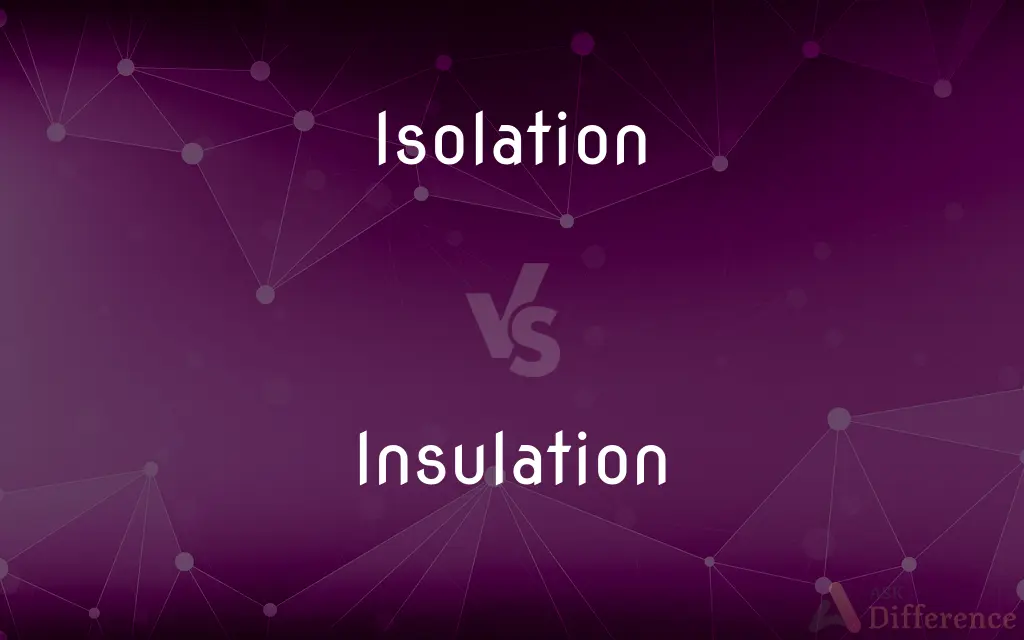Isolation vs. Insulation — What's the Difference?
By Fiza Rafique & Urooj Arif — Updated on April 3, 2024
Isolation separates entities to prevent interaction, while insulation prevents the transfer of heat, sound, or electricity.

Difference Between Isolation and Insulation
Table of Contents
ADVERTISEMENT
Key Differences
Isolation refers to the process or state of separating something from others to prevent interaction or spread, often used in contexts like medical isolation of patients to contain infectious diseases. On the other hand, insulation involves materials or methods used to prevent the transfer of heat, sound, or electricity between areas or objects, aiming to maintain energy efficiency or protect against electrical hazards.
In medical or social contexts, isolation is crucial for controlling the spread of infectious diseases by keeping infected individuals apart from healthy ones. Whereas insulation is key in construction and engineering to ensure buildings are energy efficient, safe from electrical hazards, and soundproof, serving a fundamentally different purpose.
Isolation can also apply in technological contexts, such as isolating networks or systems to prevent unauthorized access or data leaks, enhancing security. Insulation, in the context of electronics, is about preventing electrical currents from unintended paths, protecting both the device and the user from harm.
The effectiveness of isolation depends on strict adherence to protocols and procedures designed to minimize contact and cross-contamination. In contrast, the effectiveness of insulation depends on the material’s properties and the quality of its application, ensuring it adequately blocks or reduces heat, sound, or electrical conductivity.
Preventive measures in isolation involve quarantine and physical barriers to stop the spread of pathogens or contain hazardous substances. For insulation, preventive measures include using materials with high resistance to heat, sound, or electrical flow, tailored to the specific need of a building, device, or system.
ADVERTISEMENT
Comparison Chart
Definition
The act of separating to prevent interaction
Prevention of transfer of heat, sound, or electricity
Context
Medical, social, technological
Construction, engineering, electronics
Purpose
To contain disease, enhance privacy, or security
To save energy, protect, or soundproof
Key Characteristics
Quarantine, minimal contact
Material properties, resistance
Examples
Quarantining patients, isolating networks
Thermal insulation in homes, electrical insulation
Compare with Definitions
Isolation
Prevents the spread of infectious diseases.
Patients with contagious diseases are put in isolation.
Insulation
Protects against electrical hazards.
Electrical wires are insulated to prevent shocks.
Isolation
Enhances system security.
Critical systems are isolated from the internet to prevent cyber-attacks.
Insulation
Keeps homes warm in winter and cool in summer.
Installing proper insulation reduces heating costs.
Isolation
Can be physical or symbolic.
Isolating a community can lead to feelings of loneliness.
Insulation
Can reduce noise pollution.
Soundproof insulation is used in recording studios.
Isolation
Implemented in electrical circuits.
Electrical components are isolated to prevent interference.
Insulation
Involves materials like fiberglass or foam.
Fiberglass insulation is common in attics.
Isolation
Necessary in hazardous material handling.
Hazardous chemicals are stored in isolated areas.
Insulation
Essential for energy efficiency.
Energy-efficient buildings rely heavily on insulation.
Isolation
The act of isolating
Ordered the isolation of the sick patients.
Insulation
The act of insulating or the state of being insulated.
Isolation
The quality or condition of being isolated
Isolation on a desert island.
Insulation
A material or substance used in insulating
Soundproof cork insulation.
A layer of trapped air that serves as insulation.
Isolation
The state of being isolated, detached, or separated; the state of being away from other people.
She lived her final year in complete isolation, not wanting to see anybody.
Insulation
The act of insulating; detachment from other objects; isolation.
Isolation
The act of isolating.
Insulation
The state of being insulated; detachment from other objects; isolation.
Isolation
The state of not having diplomatic relations with other countries (either with most or all other countries, or with specified other countries).
Insulation
Any of a variety of materials designed to reduce the flow of heat, either from or into a building.
Isolation
(chemistry) The obtaining of an element from one of its compounds, or of a compound from a mixture
Insulation
(engineering) The act of separating a body from others by nonconductors, so as to prevent the transfer of electricity, heat, or sound
Isolation
(medicine) The separation of a patient, suffering from a contagious disease, from contact with others (compare: quarantine)
Upon returning from the field, he went into isolation for a week so as not to infect anyone with potential diseases.
Insulation
(engineering) The state of a body so separated.
Isolation
(databases) A database property that determines when and how changes made in one transaction are visible to other concurrent transactions.
Insulation
(electricity) a medium in which it is possible to maintain an electrical field with little supply of energy from additional sources.
Isolation
(psychology) A Freudian defense mechanism in which a person suppresses a harmful thought from developing into a train of thought.
Insulation
The act of insulating, or the state of being insulated; detachment from other objects; isolation.
Isolation
The act of isolating, or the state of being isolated; insulation; separation; loneliness.
Insulation
The act of separating a body from others by nonconductors, so as to prevent the transfer of electricity or of heat; also, the state of a body so separated.
Isolation
A state of separation between persons or groups
Insulation
The material or substance used to insulate from either electrical or thermal conduction; as, fiberglass is used as thermal insulation in the walls and roofs of houses.
Isolation
The act of isolating something; setting something apart from others
Insulation
The state of being isolated or detached;
The insulation of England was preserved by the English Channel
Isolation
A feeling of being disliked and alone
Insulation
A material that reduces or prevents the transmission of heat or sound or electricity
Isolation
Preference for seclusion or isolation
Insulation
The act of protecting something by surrounding it with material that reduces or prevents the transmission of sound or heat or electricity
Isolation
(psychiatry) a defense mechanism in which memory of an unacceptable act or impulse is separated from the emotion originally associated with it
Isolation
A country's withdrawal from internal politics;
He opposed a policy of American isolation
Common Curiosities
How does insulation contribute to energy efficiency?
By reducing the need for heating and cooling.
What is isolation?
Separation to prevent interaction or spread, used in various contexts.
Can isolation apply to technology?
Yes, it's used to enhance security and prevent data leaks.
Can insulation affect electrical safety?
Yes, it prevents electrical currents from causing harm.
What does insulation do?
Prevents the unwanted transfer of heat, sound, or electricity.
Why is isolation important in hospitals?
To contain infectious diseases and protect health.
What's the difference between isolation and quarantine?
Isolation separates the sick; quarantine restricts movement of those exposed.
How does sound insulation work?
By absorbing or blocking sound waves to reduce noise.
Is isolation always a physical process?
No, it can also be symbolic or digital, like isolating networks.
What materials are used for insulation?
Fiberglass, foam, and other materials with high resistance.
What role does isolation play in cybersecurity?
It helps protect sensitive data by segregating networks or systems.
Can someone be isolated for reasons other than illness?
Yes, for privacy, security, or even punitive reasons.
How does thermal insulation help the environment?
By reducing energy consumption and greenhouse gas emissions.
What types of insulation are there?
Thermal, acoustic, and electrical are common types.
Share Your Discovery

Previous Comparison
Cluster vs. Class
Next Comparison
Danger vs. FearAuthor Spotlight
Written by
Fiza RafiqueFiza Rafique is a skilled content writer at AskDifference.com, where she meticulously refines and enhances written pieces. Drawing from her vast editorial expertise, Fiza ensures clarity, accuracy, and precision in every article. Passionate about language, she continually seeks to elevate the quality of content for readers worldwide.
Co-written by
Urooj ArifUrooj is a skilled content writer at Ask Difference, known for her exceptional ability to simplify complex topics into engaging and informative content. With a passion for research and a flair for clear, concise writing, she consistently delivers articles that resonate with our diverse audience.
















































